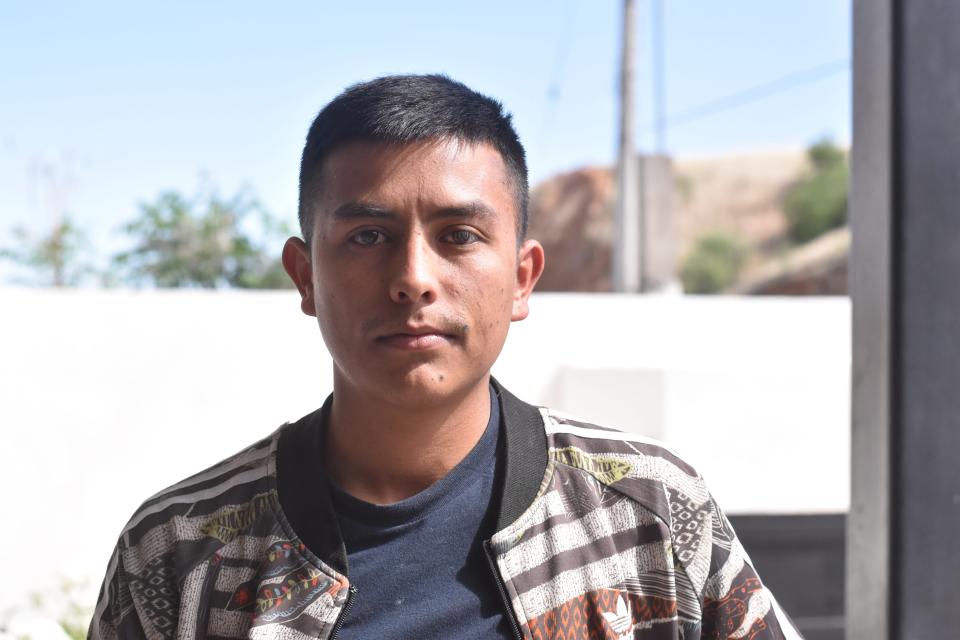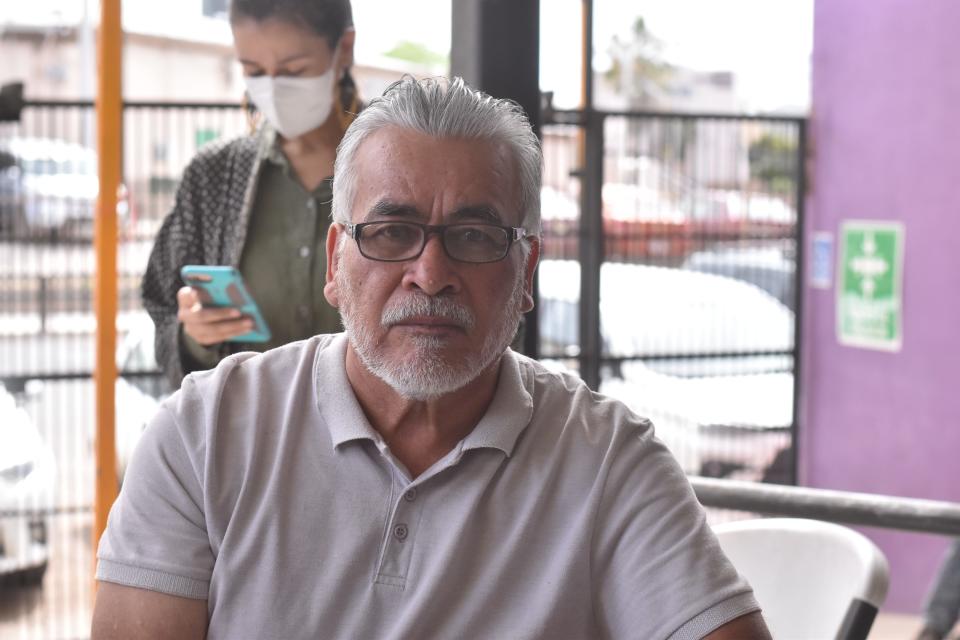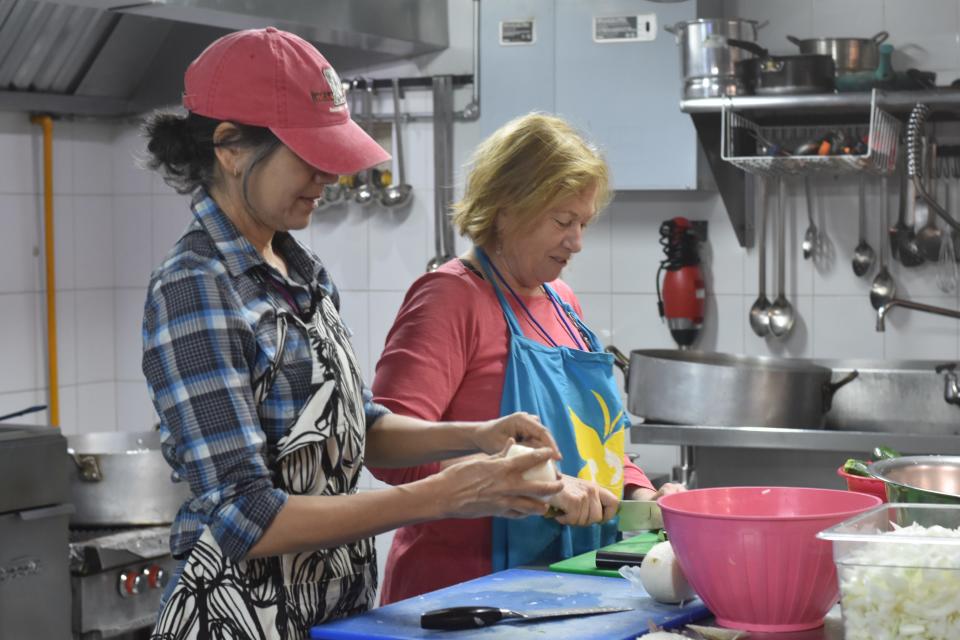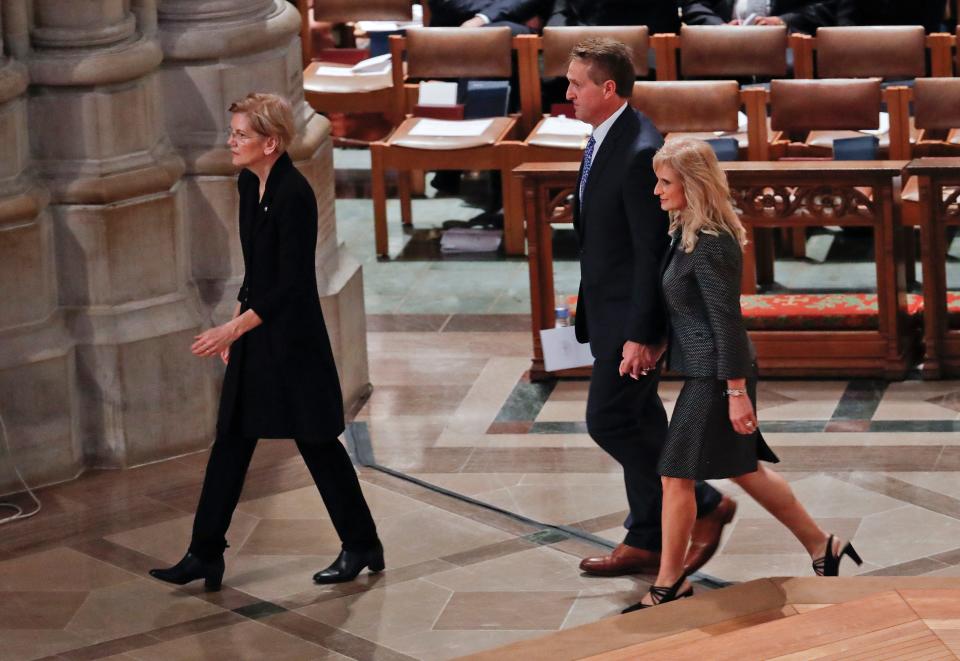As Title 42 ends, so do some migrants' chances to enter US
SONORA, NOGALES — Early Wednesday morning, a line of people filled the outdoor patio in a secured, gated migrant shelter just a few steps from a port of entry in Nogales, Arizona. Although each person came from different places and their stories varied, one thing many of them had in common was living in fear, and hoping for a chance at a safer life in the United States.
‘I was scared’

Brayan Martinez, 24, from Colombia escaped after being forcibly recruited by armed groups in Bogotá.
“I was scared, so I came here. They threatened me. They killed two of my uncles,” he said. They violated him, he said he was terrified they would kill him. One day he found an opportunity and escaped.
Martinez is not alone. According to a report by the Kino Border Initiative, in 2022, 75% of people who came to Kino, a nonprofit in Nogales Mexico reported migrating due to violence.
Escaping from a violent partner involved in the drug trade

Evangelical pastor Elias Monsivais, 67, who has been housing and feeding Venezuelans coming to Nogales for a couple weeks brought one of them to the Kino Border Initiative to see if they could help her.
At 26 years old, the woman escaped an abusive ex-boyfriend connected with the drug trade, who stalked her, locked her in a room for five days, and eventually ran her out of town, and Colombia.
She was warned he was coming to Mexico to find her.
“I’m so scared,” she said, adding that he has the resources to find her.
In their report, Kino reported that violence against women and girls is a "key driver" for the migration of people north from Mexico and Central America.
The shelters helping people who are expelled under Title 42
The shelters in Mexico serving people like Martinez and the young woman from Venezuela often depend on donations.
While the nonprofit migrant shelters in Arizona can access federal funds from the Federal Emergency Management Agency, Mexican shelters must rely on the kindness of individual donors.
On Friday, FEMA announced its awarding of $332 million to U.S. organizations providing food, shelter and services to migrants entering through the Southwest border and are waiting their immigration court proceedings. Pima County received $26 million to distribute to local organizations.
However, funds like these have not been available to shelters in Mexico taking in many of the migrants expelled under Title 42, a public health emergency law that allows immigration officials to expel migrants. The law is expected to be lifted on Thursday.
This law has barred many people legally seeking asylum. Under this law, between April 2020 and March 2022, 1.8 million people were expelled.
Many people who cross the border into the U.S. are fleeing because of poverty, gang and political violence and climate change, and are being expelled to border communities in Mexico like Nogales, Sasabe, San Luis Rio Colorado and others.
“During Title 42, the communities in Mexico really suffered a lot at the expense of U.S. policy. People who are applying for asylum or a visa are now either staying in Mexico or worse, being expulsed to Mexico from the U.S.,” said Gail Emrick, the executive director of the Southeast Arizona Health Education Center.
She reiterated that in Mexico, their resources are much more limited.
In Mexico the "poverty is much greater, and they are already a resource-strapped country, so the burden is very unfair," she said.
Emrick highlighted the need for a long-term strategy and federal funding at the border.
Shelters dependent on individual donors rather than federal grants from the U.S. or Mexico

Shelters in Sonora, a region in Mexico along the border with Arizona, are helping provide shelter, food, medical attention and services to migrants at the border. They're primarily dependent on individual donors.
While the Kino Border Initiative can meet the need, according to the organization, the organization lacks access to federal funds.
“As Congress has seen rising numbers of newly arriving asylum seekers in U.S. shelters, Arizona senators and representatives have rightly ensured increased federal funding for the U.S shelters to do the work of reception," Joanna Williams, the executive director of the Kino Border Initiative, said. “If we (Kino Border Initiative) are serving more people, we just have to hope that donors will notice … and give more funds to expand services.”
The Kino Border Initiative can house up to 85 people who are allowed to stay up to 10 days, and provides services to hundreds of people a day. They serve food, and connect people with services, from social work, to medical assistance, legal assistance and therapy services. Many come to use the shelter's Wi-Fi to apply on the CBP One application for appointments to enter the U.S. and plead their asylum cases.
With the end of Title 42 expected to occur on May 11, the Kino Border Initiative and other organizations are expecting more people to arrive at the border.
Salvavision, led by Dora Rodriguez, is another Tucson-based nonprofit organization with a center in Mexico that provides services and aid to migrants. The organization was founded in 2018, but created its resource center in Sasabe, Sonora in 2020 to provide aid to people deported under Title 42, who had no access to services.
“Our organizations are small,” she said of the shelters throughout Sonora providing services to migrants and people who have been expelled from the U.S. to Mexico.
“My organization has never been offered a grant to help sustain these services,” she added.
Rodriguez reiterated how the U.S. is sending thousands of people to the border communities that don’t have many resources.
This leaves people like Martinez who cannot return home, with little options. He said he had been trying to get an appointment on the CBP One application, the only portal for people seeking asylum, but it kept glitching and just showed him error message after error message.
He said he hopes someone can help him.
“I don’t want to return. I’m scared of going back,” Martinez said.
Some local churches have also turned into shelters

And with the need increasing as people continue to be expelled under Title 42, even churches are helping house and feed people as shelters fill up.
Monsivais who runs an evangelical church in Nogales said he was asked to take in a group of Venezuelan migrants. He provided them with food and beds, requesting funds from his congregation.
"The churches are crowded," he said.
More recently, Mexico has agreed to accept 30,000 expelled migrants a month from Venezuela, Cuba, Haiti and Nicaragua.
“What are you offering to improve the conditions of those people who you are sending to Mexico?” Rodriguez said about the new policy.
Rodriguez said with the numerous expulsions to the border, communities have seen a lot of human rights abuses, and the vulnerable migrants at risk of being kidnapped by criminal organizations in Mexico who are profiting from Title 42.
Martinez has been threatened by people at gunpoint in Nogales as he makes his daily walk from the shelter where he is staying to the Kino Border Initiative.
Expedited removal concerns humanitarian aid providers

And while supporters applaud the end of Title 42, some worry about the U.S. government’s announcement that they plan to increase expedited removals, a process that quickly deports migrants at the border.
Williams said that under expedited removal Border Patrol could either ignore their asylum claim or refer them to a fear interview and deny their case, leading to less options of legal relief in the U.S.
“This is especially troubling because under new administrative regulations the Biden Administration will make it much easier to deny their asylum claims at the fear interview stage,” she said.
'They have hopes and dreams, and lives just like us'
As a mother of a young child, Williams deeply identifies with the mothers the Kino Border Initiative helps every day. She sees families and individuals fleeing violence arriving at her shelter with significant trauma after witnessing violence, murders, and having been kidnapped.
Often, migrants cannot return home for fear of death.
“I would invite people throughout Arizona not to feel overwhelmed by the realities at the border, but to understand that the moms, dads and kids at the border are full human beings. They have hopes and dreams, and lives just like us," she said.
Reach the reporter at sarah.lapidus@gannett.com. The Republic’s coverage of southern Arizona is funded, in part, with a grant from Report for America. To support regional Arizona news coverage like this, make a tax deductible donation at supportjournalism.azcentral.com.
This article originally appeared on Arizona Republic: Title 42 fades away, making it hard for migrants to enter US

